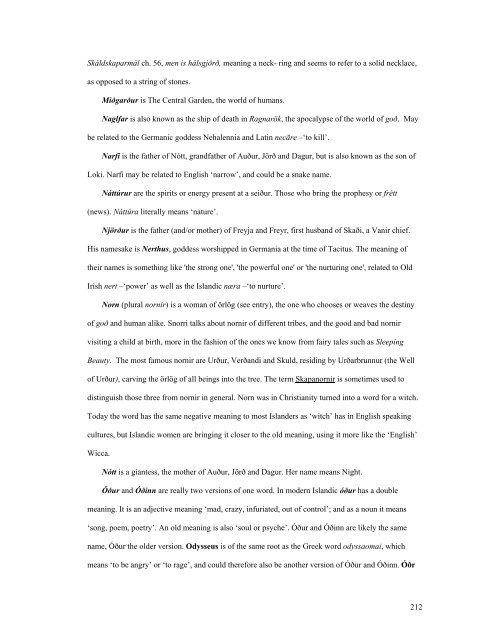Create successful ePaper yourself
Turn your PDF publications into a flip-book with our unique Google optimized e-Paper software.
Skáldskaparmál ch. 56, men is hálsgjörð, meaning a neck- ring <strong>and</strong> seems to refer to a solid necklace,<br />
as opposed to a string <strong>of</strong> stones.<br />
Miðgarður is <strong>The</strong> Central Garden, the world <strong>of</strong> humans.<br />
Naglfar is also known as the ship <strong>of</strong> death in Ragnarök, the apocalypse <strong>of</strong> the world <strong>of</strong> goð. May<br />
be related to the Germanic goddess Nehalennia <strong>and</strong> Latin necãre –‘to kill’.<br />
Narfi is the father <strong>of</strong> Nótt, gr<strong>and</strong>father <strong>of</strong> Auður, Jörð <strong>and</strong> Dagur, but is also known as the son <strong>of</strong><br />
Loki. Narfi may be related to English ‘narrow’, <strong>and</strong> could be a snake name.<br />
Náttúrur are the spirits or energy present at a seiður. Those who bring the prophesy or frétt<br />
(news). Náttúra literally means ‘nature’.<br />
Njörður is the father (<strong>and</strong>/or mother) <strong>of</strong> Freyja <strong>and</strong> Freyr, first husb<strong>and</strong> <strong>of</strong> Skaði, a Vanir chief.<br />
His namesake is Nerthus, goddess worshipped in Germania at the time <strong>of</strong> Tacitus. <strong>The</strong> meaning <strong>of</strong><br />
their names is something like 'the strong one', 'the powerful one' or 'the nurturing one', related to Old<br />
Irish nert –‘power’ as well as the Isl<strong>and</strong>ic næra –‘to nurture’.<br />
Norn (plural nornir) is a woman <strong>of</strong> örlög (see entry), the one who chooses or weaves the destiny<br />
<strong>of</strong> goð <strong>and</strong> human alike. Snorri talks about nornir <strong>of</strong> different tribes, <strong>and</strong> the good <strong>and</strong> bad nornir<br />
visiting a child at birth, more in the fashion <strong>of</strong> the ones we know from fairy tales such as Sleeping<br />
Beauty. <strong>The</strong> most famous nornir are Urður, Verð<strong>and</strong>i <strong>and</strong> Skuld, residing by Urðarbrunnur (the Well<br />
<strong>of</strong> Urður), carving the örlög <strong>of</strong> all beings into the tree. <strong>The</strong> term Skapanornir is sometimes used to<br />
distinguish those three from nornir in general. Norn was in Christianity turned into a word for a witch.<br />
Today the word has the same negative meaning to most Isl<strong>and</strong>ers as ‘witch’ has in English speaking<br />
cultures, but Isl<strong>and</strong>ic women are bringing it closer to the old meaning, using it more like the ‘English’<br />
Wicca.<br />
Nótt is a giantess, the mother <strong>of</strong> Auður, Jörð <strong>and</strong> Dagur. Her name means Night.<br />
Óður <strong>and</strong> Óðinn are really two versions <strong>of</strong> one word. In modern Isl<strong>and</strong>ic óður has a double<br />
meaning. It is an adjective meaning ‘mad, crazy, infuriated, out <strong>of</strong> control’; <strong>and</strong> as a noun it means<br />
‘song, poem, poetry’. An old meaning is also ‘soul or psyche’. Óður <strong>and</strong> Óðinn are likely the same<br />
name, Óður the older version. Odysseus is <strong>of</strong> the same root as the Greek word odyssaomai, which<br />
means ‘to be angry’ or ‘to rage’, <strong>and</strong> could therefore also be another version <strong>of</strong> Óður <strong>and</strong> Óðinn. Óðr<br />
212


